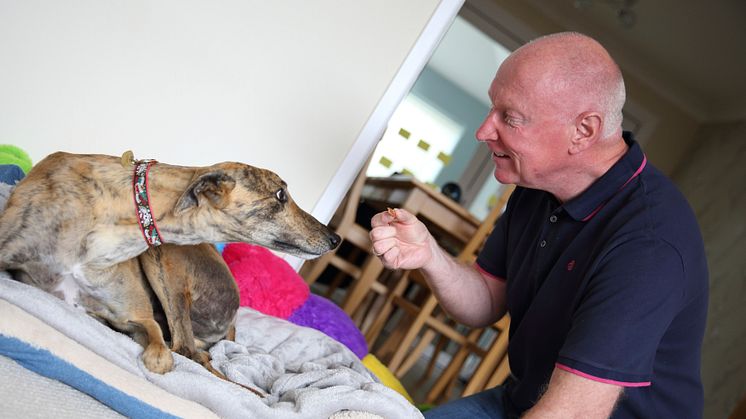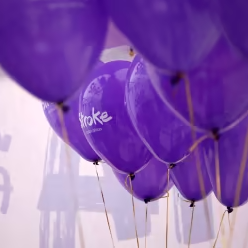
Press release -
Stroke risk for UK adults could be reduced through starting one small change
UK adults could take steps to avoid having a stroke if more people knew the top risk factors for stroke and made one small change to their lifestyle, the UK’s leading stroke charity says.
The Stroke Association is launching a national campaign inspiring people to pledge to make one small change to reduce their risk of stroke ─ starting on Stroke Prevention day, Thursday 14 January ─ and stop stroke being the fourth biggest cause of death in the UK.
New survey results by the Stroke Association found that only one in 20 (6%) UK adults think they’re at high risk of stroke1. This is despite the fact that, in the UK, more than one in every five (21%) adults will have a stroke in their lifetime2.
The new research commissioned by the charity shows this may be because people don’t know what puts them at risk. Half (47%) of the country don’t know that high blood pressure is a top risk factor for stroke1. Blood pressure is one of the biggest causes for stroke and 55% of stroke patients have hypertension (high blood pressure) when they have their stroke3.
This is concerning because conservative estimates predict that as many as 1 in 6 adults have high blood pressure4, but only 14% of people would focus on their blood pressure to reduce their stroke risk.
Nine in 10 (89%) strokes are associated with modifiable risk factors5, elements of your lifestyle that can be changed to reduce your risk. According to the INTERSTROKE study, the world’s largest study of stroke causes, the modifiable risk factors that cause the most strokes in countries such as the UK are high blood pressure, high body weight and poor diet.
Worryingly, knowledge of the top risk factors for stroke was low across the board:
- Three in four people (71%) don’t know that weight is a top risk factor that can increase your risk of stroke
- Nine in ten people (87%) don’t know that your diet is a top risk factor that can increase your risk of stroke
Juliet Bouverie, Chief Executive at the Stroke Association says, “A stroke happens in the brain, the control centre for who we are and what we can do. Stroke is the fourth biggest cause of death in the UK, but it doesn’t need to be. For those that survive, the impact varies depending on which part of the brain is affected. It could be anything from wiping out your speech and physical abilities, to affecting your emotions and personality. Many strokes can be avoided if you take action.
“When you don’t know your risk, you there’s no motivation to reduce it. Most people know that living a smoke free life, drinking carefully and eating healthily is good for you, but it’s clear from our research that people aren’t always sure why these are important things to do. If more people understood the benefits of making healthy changes, more people would act to reduce their stroke risk.
“The biggest thing you can do reduce your risk of stroke is to start by making one small change. We want to help as many people as possible to understand the personal risk of stroke and make that first, positive step to prevent having one. It can happen to anyone, at any age and at any time, but we know that people who take steps to reduce their risk are less likely to have a stroke.”
The survey results found a lack of understanding of the risk factors that increase your risk of stroke and a shocking lack of information being accessed to help people reduce their risk. Three in four people (73%) said that they have had no information about stroke reduction recently. This rockets to over four in five (85%) of over-65s, who are most at risk of having a stroke1.
- To help people to make one small change, the Stroke Association have launched a campaign in partnership with Rotary GB&I, LoSalt and OMRON Healthcare ─ pledge to make #OneSmallChange on Stroke Prevention Day and receive guidance on how to stick to your one small change. Visit www.stroke.org.uk/PreventionDayto find out how.
ENDS
For more information, please contact Martin Oxley, PR & Media Officer at the Stroke Association at martin.oxley@stroke.org.uk or 07770 733822.
About the research
Statistics based on a 4Media Relations nationally representative survey of 2,000 members of the public, excluding stroke survivors, conducted in December 2020.
References
1: Research conducted by 4Media Relations on behalf of the Stroke Association, December 2020
2: GBD 2016 Lifetime Risk of Stroke Collaborators, Global, regional, and country-specific lifetime risks of stroke, 1990 and 2016. Supplementary Appendix, Pg90. https://www.nejm.org/doi/full/10.1056/NEJMoa1804492
3: Sentinel Stroke National Audit Programme (SSNAP) annual results portfolio, 2019-20. https://www.strokeaudit.org/results/Clinical-audit/National-Results.aspx
4: Taken from the latest Quality and Outcomes Framework (QOF) figures from individual home nations.
5: Global and regional effects of potentially modifiable risk factors associated with acute stroke in 32 countries (INTERSTROKE): a case-control study, VOLUME 388, ISSUE 10046, P761-775, AUGUST 20, 2016
Topics
- Stroke strikes every five minutes in the UK and it changes lives in an instant.
- The Stroke Association is a charity working across the UK to support people to rebuild their lives after stroke. We believe that everyone deserves to live the best life they can after stroke. From local support services and groups, to online information and support, anyone affected by stroke can visit stroke.org.uk or call our dedicated Stroke Helpline on 0303 3033 100 to find out about support available locally.
- Our specialist support, research and campaigning are only possible with the courage and determination of the stroke community and the generosity of our supporters. With more donations and support, we can help rebuild even more lives.
- You can follow us on Twitter, Facebook and Instagram.











